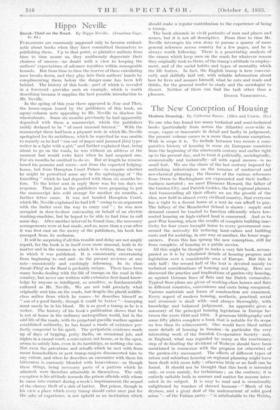Hippo Neville
PUBLISHERS are commonly supposed only to become enthusi- astic about books when they have committed themselves to publishing them. Up to that point, so plaintive authors from time to time assure us, they assiduously depreciate their chances of success—no doubt with a view to keeping the authors' expectations of advance royalties within manageable bounds. But from time to time the reserve of these calculating men breaks down, and they play into their authors' hands by complimenting them before the danger-zone has been left behind. The history of this book—part of which is revealed in a foreword—provides such an example, which is worth describing because it supplies the best possible introduction to Mr. Neville.
In the spring of this year there appeared in Now and Then, the house-organ issued by the publishers of this book, an agony-column note appealing to Mr. Neville to disclose his whereabouts. Some six months previously he had apparently deposited with them a manuscript, which the publishers rashly declared to be " of most unusual interest." With the manuscript there had been a piquant note in which Mr. Neville apologised for its untidiness, which he regretted he was unable to remedy as he had "run out of paper and jammed [his] type- writer in a fight with a girl," and further explained that, being about to go on the roads, he was without an address at the moment but would write later when he had acquired one. For six months he omitted to do so. But at length he remem- bered his promise and wrote—not from the expected lodging- house, but from Hampton Court Palace—to enquire whether be might be permitted some say in the upbringing of " the foundling " which Ile had deposited with them six months be- fore. To the letter sent in reply there was for ten days no response. Then just as the publishers were preparing to put the manuscript into cold storage for another six months, a further letter came. It was not headed Hampton Court, which Mr. Neville explained he had left " owing to an argument with the butler over the way to curry cod " ; he was now occupied in door-to-door canvassing on behalf of an electric washing-machine, but he hoped to be able to find time to call some day. After another interval he found time, the necessary arrangements were at last made, and so, more than a year after it was first east on the mercy of the publishers, his book, has
i'nerged from its seclusion.
It will be surprising if all this trouble and delay are not amply repaid, for the book is in itself even more unusual, both in its Matter and in the manner in which it is written, than the way in which it was published. It is consistently entertaining from beginning to end and—to the present reviewer at any rate—consistently and excitingly informing. In its class Sneak-Thief on the Road is probably unique. There have been ninny books dealing with the life of tramps on the road in this country, but never one written with extensive first-hand know- ledge by anyone so intelligent, so sensitive, so fundamentally • cultured as Mr. Neville. We are not told precisely what originally sent him on the roads, but despite the placid middle- class milieu from which lie comes—he describes himself as " son of a good family, though it could be better "—tramping must surely be in his blood. He is as good a tramp as he is a writer. The history of his book's publication shows that he is not at hothe in the ordinary metropolitan world, but in the odd life of the roads, with its perpetual guerilla warfare against established authority, he has found a mode of existence per- fectly congenial to his spirit. The peripatetic existence made up of days of begging, petty thefts, an occasional job, and nights in a casual ward, a convenient out-house, or in the open, seems to satisfy him, even in its hardships, as nothing else can. Not even the privations and rebuffs which he met with from mean. householders or pert tramp-majors disconcerted him to any extent, and when he describes an encounter with them his bitterness is curiously blended with benevolence—as though these things, being necessary parts of a pattern which he admired, were therefore admirable in themselves. The only exception is his attitude towards the prison officials with whom he came into contact during a week's imprisonment, the sequel of the clumsy theft of a slab of butter. But prison, though in his view a place which every tramp should enter once just for the sake of experience, is not upheld as an institution which should make a regular contribution to the experience of being a tramp.
The book abounds in vivid portraits of men and places and scenes, but it is not all descriptive. From time to time Mr. Neville interrupts his own story to pursue a quarry of more general reference across country for a few pages, and he is always worth following. There is a penetrating analysis of the causes which keep men on the roads for whatever reason they originally took to them, of the tramp's attitude to employ- ment, and of the social habits and types of mentality which the life fosters. In fact, the English tramp is here conveni- ently and skilfully • laid out, with reliable information about how he lives and amuses himself, what he eats and reads and thinks, for the general reader to study and the sociologist to dissect. Neither of them can find the task other than a










































 Previous page
Previous page